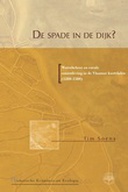Explore

The Spade in de Dijk is the first synthesis on the organisation of water management in Coastal Flanders during the later Middle Ages. Based on the unique archival evidence produced by local water boards (wateringen), large landowners and local and regional authorities, Tim Soens argues for the occurrence of profound changes in coastal water management in the later Middle Ages. Water management gradually became less inclusive, investments lowered, and flood risk increased. This evolution was triggered by the social transition from a peasant society of land-owning smallholders to a society of absentee landlords and large tenant farmers.
This book is included in DOAB.
Why read this book? Have your say.
You must be logged in to comment.
Rights Information
Are you the author or publisher of this work? If so, you can claim it as yours by registering as an Unglue.it rights holder.Downloads
This work has been downloaded 412 times via unglue.it ebook links.
- 194 - pdf (CC BY-NC) at OAPEN Library.
Keywords
- Belgium
- c 1000 CE to c 1500
- c 1500 to c 1600
- coastal Flanders
- Dikes (Engineering)
- Early history: c 500 to c 1450/1500
- Europe
- European History
- Flemish
- For emergent readers (adult)
- Geographical Qualifiers
- Germanic & Scandinavian languages
- History
- History: earliest times to present day
- History: specific events & topics
- Humanities
- Indo-European languages
- Interest age & special interest qualifiers
- Interest age / level
- Language qualifiers
- Maritime history
- Middle Ages
- Modern period, c 1500 onwards
- Reclamation of land
- Regional & national history
- thema EDItEUR::1 Place qualifiers::1D Europe::1DD Western Europe::1DDB Belgium
- thema EDItEUR::2 Language qualifiers::2A Indo-European languages::2AC Germanic and Scandinavian languages::2ACF Flemish
- thema EDItEUR::3 Time period qualifiers::3K CE period up to c 1500
- thema EDItEUR::3 Time period qualifiers::3K CE period up to c 1500::3KL c 1000 CE to c 1500
- thema EDItEUR::3 Time period qualifiers::3M c 1500 onwards to present day::3MD 16th century, c 1500 to c 1599
- thema EDItEUR::5 Interest qualifiers::5A Interest age / level::5AX For adult emergent readers
- thema EDItEUR::N History and Archaeology
- thema EDItEUR::N History and Archaeology::NH History::NHD European history
- thema EDItEUR::N History and Archaeology::NH History::NHT History: specific events and topics::NHTM Maritime history
- Time periods qualifiers
- water boards
- Water districts
- water management
- Western Continental Europe
Links
DOI: 10.26530/OAPEN_611030Editions

